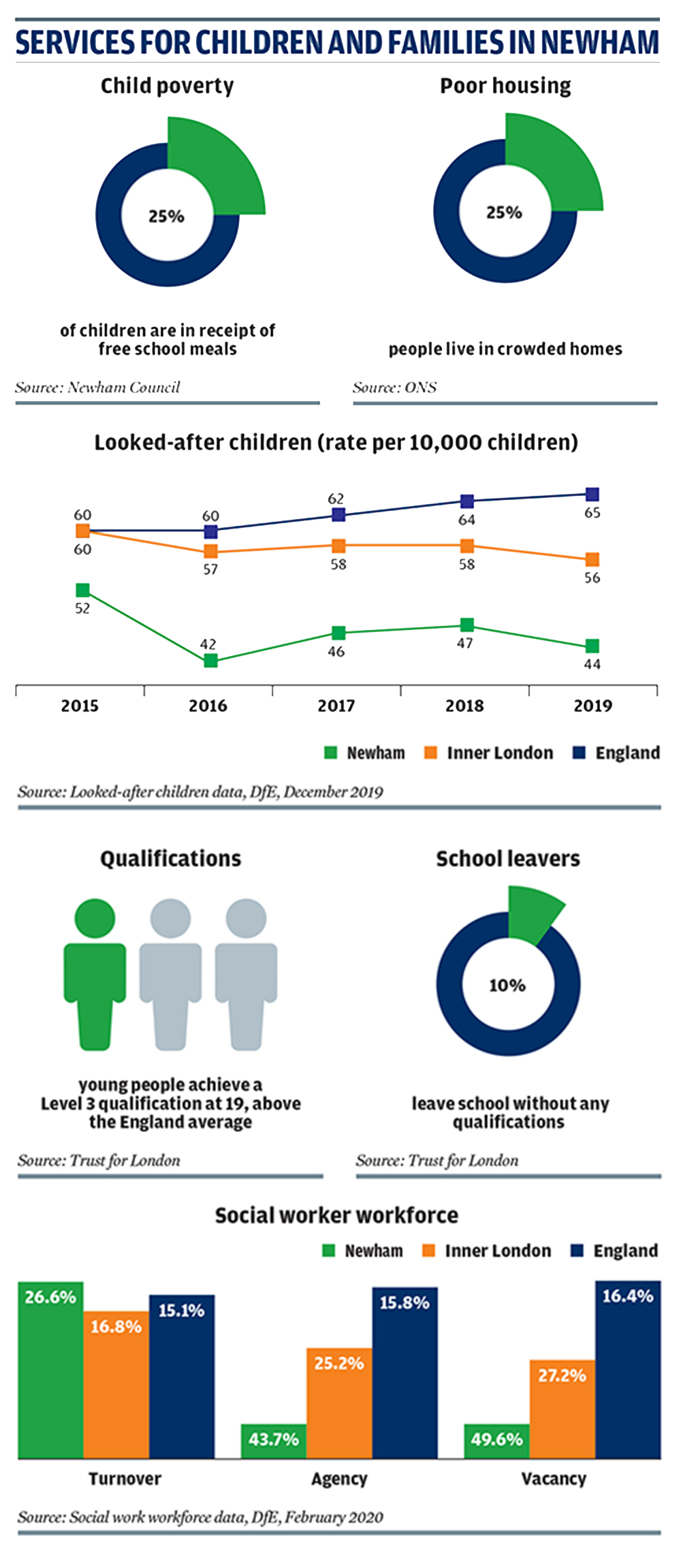
The UK’s rich cultural diversity was famously celebrated at the opening ceremony of the London 2012 Olympics, held at the Olympic Park in Stratford in the borough of Newham. The inner London borough itself reflects the diverse communities showcased during the ceremony: Asian heritage people make up 46 per cent of the population, 18 per cent are of black heritage and four per cent mixed race. Over the past 20 years, the borough has seen its white population shrink from 39 to 27 per cent, and now has the lowest percentage of white British residents in the capital.
However, this demographic shift has not seen a change in the social challenges facing the area, many of which date back decades. Data from poverty charity Trust for London shows that Newham has higher rates of child poverty, households in temporary accommodation and leaving school with no qualifications than the London average. It also has poor health outcomes for children and young people and the population as a whole. The area is economically deprived and has an unemployment rate of 6.5 per cent compared to the London average of 4.7 per cent.
Quality of provision
It is against this backdrop that the council’s children’s services department was rated “inadequate” by Ofsted in February 2019, after inspectors found a “significant deterioration” in the quality of provision since the last judgment in 2014 when it was rated “requires improvement”. The 2019 judgment was critical of its social work practice, particularly permanence planning and record keeping, and support for many care leavers was deemed non-existent. There was also a lack of focus on early help.
Leadership in corporate parenting was found to be lacking, there was no embedded culture of learning in the department and inspectors found “little evidence that senior managers and leaders actively listen to children and families and use feedback to improve services”.
In October 2019, the council appointed Tim Aldridge as director of children’s services (DCS) from the London borough of Havering, where he’d spent four years running children’s services and overseen its improvement from a requires improvement to “good” rating. Aldridge comes with a track record of developing workforce skills and had overseen an improvement in Havering’s leaving care, assessment and safeguarding services.
With a steep improvement hill to climb, the council has backed Aldridge by announcing in January that it will invest £4.5m in recruiting 40 new youth workers and double the number of youth clubs to ensure the borough is a safe place for young people. This is in addition to a £1.4m investment in youth zones announced in June 2019. Aldridge is confident progress is being made in the other priority areas, with the results of a recent Ofsted monitoring visit encouraging (see DCS view).
The department’s improvement journey will be made all the harder by Covid-19. Prior to the pandemic, its Universal Credit claimant rate was three per cent, the same as London and England averages. In October, the claimant count had risen to 10 per cent, compared with eight per cent in London and 6.6 per cent for the country. Poor housing – Newham has the highest rates of overcrowded homes in London – has also been highlighted as a key factor in the borough having one of the highest death rates from Covid-19.

DCS VIEW
SYSTEMIC PRACTICE APPROACH HAS CREATED FOUNDATIONS FOR IMPROVEMENT
 By Tim Aldridge, director of children’s services, Newham Council
By Tim Aldridge, director of children’s services, Newham Council
I joined Newham just over a year ago to lead children’s services in their improvement journey, following the “inadequate” Ofsted rating. Newham is a fantastic place – it is highly dynamic and rich in culture and going through significant regeneration.
Newham has a population of 86,500 children and young people under the age of 19. Newham also has significant challenges – 22 per cent of children live in low-income families with 38 per cent of children eligible for free school meals. Newham has 354 children subject to a child protection plan, 752 children in need plans and 405 children in care.
Other key challenges include overcrowding and a lack of local affordable housing, creating homelessness and significant numbers of children and families living in temporary housing, local health inequalities and high incidences of childhood obesity, asthma and mental ill health.
Newham offers significant opportunities for professional development and provides all the challenges you would expect from a vibrant inner city context. Demand for children’s services includes significant numbers of children impacted by domestic violence, exploitation and serious youth violence.
In addition to these issues, Newham has also experienced the impact of Covid-19. We know that the pandemic has had a disproportionate impact on parts of the community with pre-existing disadvantages and inequality. Newham was one of the most adversely affected areas of the UK during the first wave of the pandemic and had a significant impact on children and young people. We’ve seen an increase in the proportion of referrals relating to domestic violence and greater severity. There have been different patterns of exploitation and we are starting to see the true extent of the impact on the emotional wellbeing of our children and young people.
To drive improvements across the services in Newham we have developed the Newham Together practice framework. This is a relational and systemic approach to practice, centred on our six Cs: Co-production, Curiosity, Confidence, Clarity, Community and Compassion. Through this practice model we are investing in developing the professional skills of our practitioners across the workforce. Our aim is to provide support to families that facilitates positive change through family-based decision making.
A central challenge in Newham was to create an environment that supports good practice. Our response has been to shape a more appreciative culture, where we recognise small steps forward while always being open to learning and improvement.
After an Ofsted focused visit in October, I am pleased that the inspectors have seen progress, with a workforce that has felt supported through the pandemic, a partnership that has pulled together, and a leadership team that has a clear understanding of our strengths and a determination to address areas that require improvement. I am confident that we have the right drive and ambition, and through our purposeful, planned and focused approach, I know we can make an impact where it really counts.

